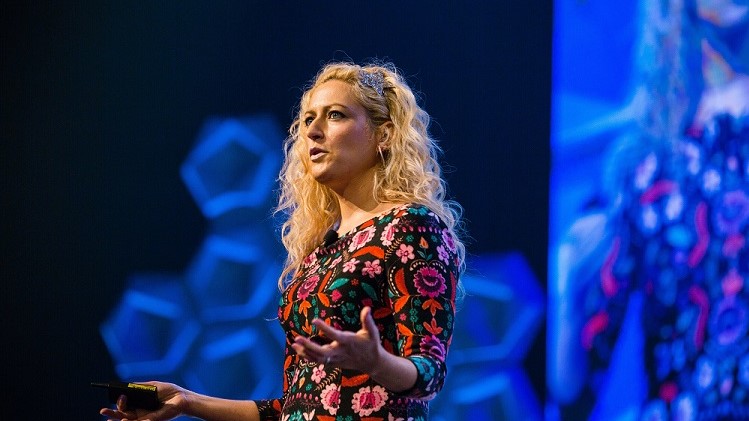Seventy-six percent of Australian workers are disengaged with their work, but using principles from video games could change this.
Opening her keynote at Reimagination, internationally-renowned game developer Dr Jane McGonigal, brought to light how the brain’s response to gaming can be extrapolated to increase engagement in the workplace – and in other areas of life.
“Games have been carefully constructed to maximise our sense of engagement," said McGonigal.
"They are places where we can improve our skills, set and achieve goals, surrounded by people who share values and goals, and they bring out the best of our skills and talents."
McGonigal has been studying the psychology of games for 16 years, with a focus on how the games we play change our approach to real life work and problem-solving. She is the first person in the world with a PhD in this area.
“Most people do not want to escape reality, we are just looking for better engagement,” she said.
This better engagement is present in games. According to research by Stanford University, when playing games, the brain’s addiction centre can fire up to 60 times per minute.
“The brain fires up because it anticipates something good is happening, something that we want,” said McGonigal.
This hyperactivity in this region of the brain directly increases the physical and mental energy to pursue our virtual goal, creating an attitude of resilience and commitment to succeed.
“Gaming is an environment where there will always be another turn, another strategy to try and pursue that goal.
“That explains why when you lose a level, you’re still committed to trying again,” said McGonigal.
The learning and memory centre of the brain is also activated by receiving immediate feedback because of the instant result of your actions.
“This feedback makes gamers learn and improve to make better choices to take better actions,” said McGonigal.
Health benefits
This is exactly what drives people to spend hours and hours gaming. With 2.6 billion people playing at least an hour of video games every day, these regions of the brain become so hyperactive that in one study, over 60% of Australian gamers stated they perceived physical, psychological, emotional and mental health benefits from gaming.
According to the Digital Australia Report, 78% of gamers perceive more open-mindedness as a result of gaming – which, according to McGonigal, makes perfect sense given that games require psychological flexibility when it comes to strategy; 74% perceive they are more optimistic; 70% said gaming decreases anxiety; 72% said it betters their social connections; and 68% of adult gamers perceive gaming adds purpose to their life.
The 2016 augmented reality game Pokémon Go -- which requires collaboration, movement, problem solving and provided an abundance of resources to users -- had benefits so profound that people hardwired to avoid exercise (50% of the global population) would play it regardless because of the opportunities to succeed.
“Increased activity in this region of the brain is associated with a higher work ethic and with more resilience in the face of obstacles,” said McGonigal.
The same two regions of the brain that shrink in size in clinically depressed brains are chronically and hyperactively stimulated by video game play. So, game play is literally the neurological opposite of depression.
Translating to the workplace
McGonigal said this reverse-engineering through gaming can be extrapolated to the workplace via three prevalent lessons: on-demand success, abundance of resources, and collaboration.
“It’s all about altering small habits,” said McGonigal.
On-demand success can be achieved on a rudimentary level by giving employees daily positive feedback, as opposed to giving out feedback only when it’s critical.
“You want your employees every day they show up at work to feel like something good can happen, that there is an opportunity for positive feedback today, [and] every day.”
Secondly, games provide a sense of abundance. Pokémon Go allows every user to have access to every single resource without having to compete for it.
“In gaming, nobody has to fail for you to succeed; nobody has to lose a resource, so you can gain a resource,” said McGonigal.
McGonigal said one of the most psychologically damaging workplace practices is stack ranking, where employees are ranked upon their skills, and those under a certain number are at risk of not getting raises, promotions or getting fired.
“There’s no way for everyone to succeed – literally people are going to win or fail,” she said.
McGonigal said rethinking this practice, especially within the technology sector where it is prevalent, to one where our competitors are reframed as allies, is crucial.
“Changing the language creates the space for the opportunity to say, ‘What would I be like if we collaborated with our biggest competitor?’
“You have to make sure other employees are seen as people you can cheer for and support their success,” said McGonigal.
This also makes it easier to form a collaborative community within the workplace on a baseline level.
In gaming, 2 out of 3 dollars and hours are spent helping others. McGonigal said this principle can be translated to the workplace by using different social media and enterprise apps to have a better sense of what people are doing, and using it as an occasion to rise to help.
“You don’t have to change the nature of work, but you want certain mental habits to be part of your daily routine,” she said.
Walking meetings are another habit that encourages people to work collaboratively by consciously and unconsciously having to mirror each other’s stride, pace and style.
“Gaming encourages shared attention where your minds are working together and agreeing to play by the same rules – there’s trust.
“That same mindset can be brought to the real-world,” she said.










